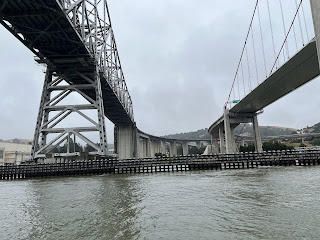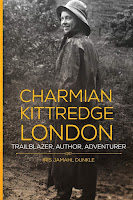I write this from Kaneohe on the island of Oahu in Hawaii. The trade winds blow through windows that look out on the jagged Ko’olau Range. The desk at which I am working belongs to the grandson of a primary character in my biography about Jack London and his formative, lifelong relationship with San Francisco Bay. My host’s “grandpa” was Yoshimatsu Nakata, London’s longtime valet, first mate, and surrogate son.
I am on a
two-month writing retreat. While this retreat is extra special, it is an
example of the type of writing retreat I have given myself for years: When
friends and family go on vacation, I retreat to their houses and write.
Most people associate writing retreats with residency programs. As an example, I launched my biography about Ina Coolbrith during a month-long residency at Blue Mountain Center in the Adirondacks, where I studied my subject and swam in the lake every day. As the leaves started to change color at the end of September, the mail carrier told me, “We don’t do that here.”
Residency
programs are great but there is another way to give yourself the gift of
concentrated writing, and that is the way that led me to Kaneohe. It’s simple,
with no application or competition required. When friends and family go on a
trip, I lug my materials to their homes in San Francisco, Berkeley, or Gilroy,
California (or in this case, across the ocean to Oahu), and work without the
distractions of home. Yes, I walk the dog, clean the kitty
litterbox, and put the chickens in a coop at night, but these are minor chores
compared to the rewards. Separation from your own living space results in
concentrated writing time that can help you go deeper and make connections, get
more work done, and form new habits.
Here in Kaneohe, I have established a new routine. I go to bed early and wake up naturally before dawn. While the coffee is brewing, I shun my phone with its distracting emails and disturbing news. Instead, I do five sun salutations and read a poem. I got the poem idea from editor Susan Leon at the most recent Biography Lab. (I was here in Oahu during the Lab and that afternoon found a Poem a Day book in my host’s bathroom.) .
Serendipity can happen on a writing retreat. More than a decade ago, while working on a biography of the poet Ina Coolbrith, I was on a retreat at a friend’s house in Berkeley, California. One day on my routine lunchtime walk in the residential hills, I discovered a cluster of paths, stairways, and streets named after literary men I had been writing about that morning! Bret Harte, Charles Warren Stoddard, and Mark Twain were represented, but where was Ina? The byways were all named after men, most of whom had left California, whereas Ina had stayed and become California’s first poet laureate (and has recently been inducted into the 2025 CA Hall of Fame). To include her, I recited her poetry on subsequent walks.
When the book was
finished, I gave a reading at a Berkeley bookstore and suggested that Harte give up one of his four byways. Several local groups heeded the
call and changed the name of Bret Harte Lane to Ina Coolbrith Path and installed a handsome biography
plaque at the bottom of the stairway.Ina Coolbrith Circle's Richard Angilly and Claire Baker
(with me in the middle) help celebrate the new path in 2017.
Serendipity
can happen, but poop also happens when there are dogs, cats, bunnies, and
chickens involved. It is unlikely that you, like me, will get locked in a
chicken coop at dusk without your phone for 30 minutes before discovering the
string that sets you free, or that you will have a naughty beagle that growls
at your host’s puppy at mealtime. You will, however, leave the dishes in the
sink, cook when you feel like it, and remain un-showered for days to put your
writing first.
My writing retreats usually last from five days to two weeks, so how is it that I get to stay at this comfortable and quiet home in Kaneohe for two whole months? I met my host by letter and then visited him and his wife in Kaneohe last year. They graciously showed me family photos and we paid our respect at Nakata’s grave (everyone called him Nakata, not Yoshimatsu). Back at home in California, I shared all my research about Nakata with his grandson. He was grateful because although as a boy he knew his grandpa, the two never talked about Nakata’s early years with London. After leaving London’s employ, Nakata became a dentist and lived a long and fruitful life in Honolulu.
Last
summer, my hosts visited Jack London State Park in Glen Ellen, California. I
arranged for a docent to show them around and joined them. As we drove around
the park in a bumpy golf cart, I mentioned my writing retreats. I wasn’t
thinking about their home in Oahu, but they latched onto the idea. They wanted
to travel and, as they are supportive of my project, the plan blossomed
from there.
——
A longer version of this essay first appeared in “The Biographer’s Craft: The Magazine for Writers and
Readers of Biography,” Biographers
International Organization, April 2025, V 20, No 2. Aleta has been a member
of Biographers International Organization since 2021.























